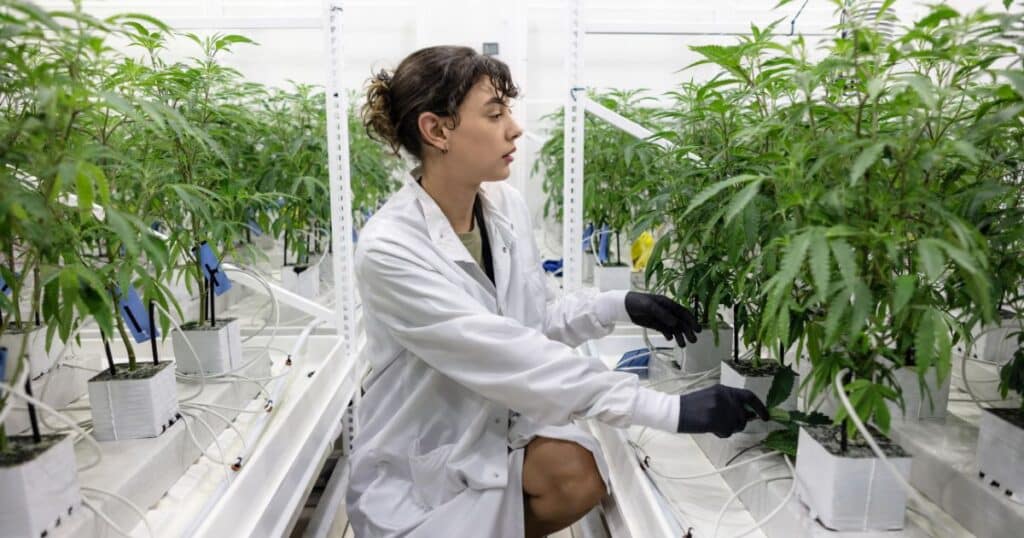California officials recently uncovered a disturbing trend among some of the state’s largest cannabis companies – they were engaging in labor practices that circumvented state law. California’s Agricultural Labor Relations Board (ALRB) investigation revealed that some of these companies had been signing labor peace agreements with fake unions. This practice was intended to give them an unfair competitive edge.
The companies involved include the Parent Company, Nabis, Herbl, and Glass House Group – all of which had signed LPAs with sham unions instead of legitimate ones. These fake unions operated without members and showed little to no outward intent of organizing workers.

This investigation has put the spotlight on how these cannabis companies have been attempting to skirt labor laws and regulations, as well as the role California state law has in preventing such practices. The situation also highlights how important it is for companies to do their due diligence on these unions before signing any labor contracts – a step that may have saved them from legal trouble.
What Is The LPA?
The Labor Peace Agreement (LPA) is an integral part of the cannabis industry in California, which requires cannabis businesses to sign a labor peace agreement with a “bona fide labor organization” before receiving their license. Companies with 20 or more employees must sign an LPA in accordance with California law.
An LPA is a nonbinding pact between an employer and a union that states the company will not interfere with the union’s organizing activities. This helps create an even playing field for both the employer and employee and protects employees from unfair labor practices.
The LPA also ensures that workers have a voice in the workplace and can protect them from potential exploitation. It is important for employers to understand their obligations under an LPA and ensure they are following the law to keep their business running smoothly. By signing a legitimate union, companies guarantee that they will comply with California’s labor regulations.
The Players Involved Using Fake Unions
The California ALRB’s investigation into fake unions has put four of the largest cannabis companies in the spotlight. Parent Company, Nabis, Herbl, and Glass House Group were all found to have signed LPAs with sham unions instead of legitimate ones, per MJBizDaily and SFGATE.
The investigation into fake unions at some of the largest cannabis companies in California was sparked by a complaint from the International Brotherhood of Teamsters. The union filed a complaint with the ALRB accusing ProTech, one of the sham unions involved, of not having employees or any genuine interest in organizing workers.
This prompted an investigation by the ALRB, which revealed that ProTech, NAWU, and Nc3 Systems were not legitimate unions. The ALRB’s findings have since prompted companies to terminate their contracts with these fake unions and sign labor peace agreements with legitimate ones.
ProTech is a union that describes itself as “a unique labor organization dedicated to the cannabis industry.” It was found to be a sham union with no employees, no interest in organizing workers, and little evidence of any actual labor-related activity.
The National Agricultural Workers Union (NAWU) is a union based out of California that represents agricultural workers. However, there was little to no evidence that NAWU had any actual activity going on in the cannabis industry at the time of the investigation.
The third union involved, Nc3 Systems, is an online union based out of New Jersey that claims to be “a platform for organizing workers in the 21st century.” However, there was also little evidence of any activity going on within the cannabis industry at the time of the investigation.
These sham unions had been used by companies in order to circumvent California labor law and gain a competitive edge over other businesses. The ALRB’s findings highlighted how important it is for employers to do their due diligence when signing labor peace agreements and to ensure they are signing with legitimate unions.
Parent Company is a vertically integrated holding company based in California, focusing on strategic investments and professional services for the cannabis industry. Nabis is a leading California-based cannabis distribution and brand company in business since 2017. Herbl, a major distributor that recently went out of business. Glass House Group is a vertically integrated cannabis company based out of Long Beach, California.
The ALRB’s investigation has called into question these companies’ actions and intentions when signing the LPAs with these fake unions. It is easy to see why companies like Parent Company, Nabis, Herbl, and Glass House Group would try to circumvent the rules – but it has also sparked a debate about whether or not their actions were intentional or simply a case of negligence.
California Law & Regulations
The investigation findings in California point to the importance of state law and regulations regarding labor peace agreements. California companies cannabis businesses with 20 or more employees must sign an LPA with a “bona fide labor organization” before receiving their license. This new law prevents companies from signing false labor peace agreements with fake unions.
By requiring companies to sign an LPA with a legitimate union, the state of California is attempting to protect workers from exploitation and unfair labor practices. It also ensures that employers follow the law and comply with California’s labor regulations. By doing their due diligence on these unions before signing any contracts, companies can help ensure they are in compliance with the law.

The ALRB’s investigation into fake unions shows just how important it is for cannabis companies to do their due diligence when signing labor peace agreements. By understanding their obligations and following the law, employers can help protect workers from exploitation and create an even playing field for employees and employers alike.
The termination of contracts with these sham unions means that companies like Parent Company, Nabis, Herbl, and Glass House Group are now required to find new legitimate unions to work with. This could potentially put them at a competitive disadvantage compared to their rivals, which signed labor peace agreements with real unions.
The findings of this investigation have also called into question whether or not these companies were intentionally trying to circumvent the rules. It is easy to see why companies would try to take advantage of loopholes in the law, but it is also difficult to believe that they did not know the risks involved.
Keep updated on all the latest news and updates in the Cannabis industry here at Beard Bros Pharms by signing up for our Friday Sesh Newsletter here. Always Dank and Never Spam!
















